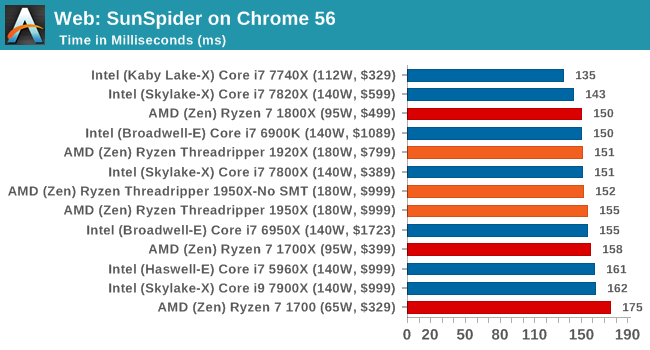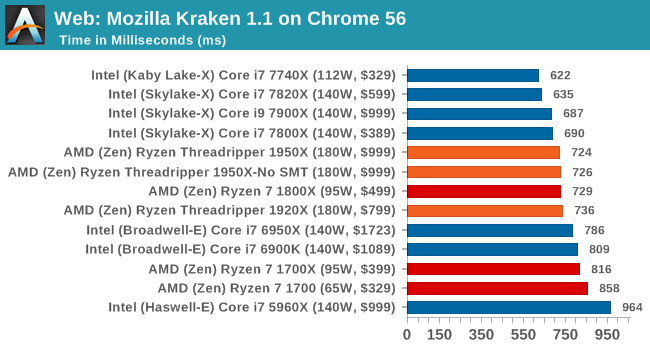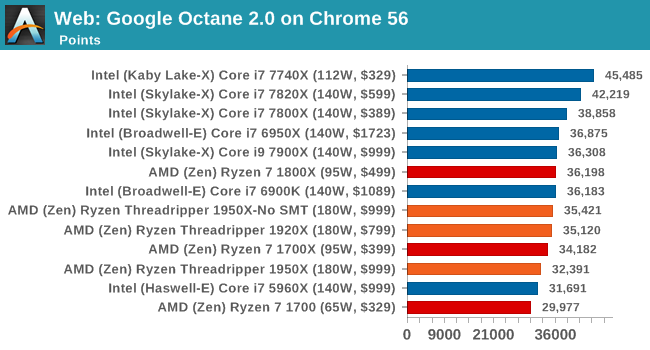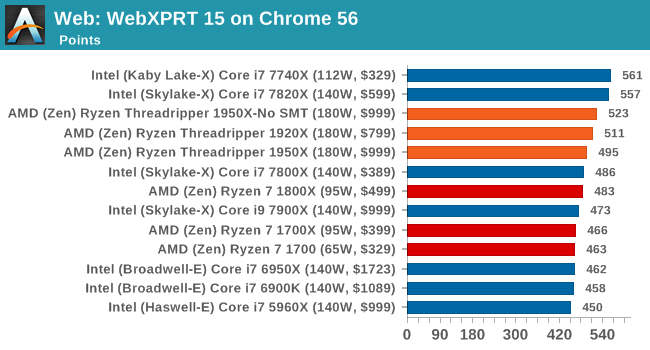The AMD Ryzen Threadripper 1950X and 1920X Review: CPUs on Steroids
by Ian Cutress on August 10, 2017 9:00 AM ESTCPU Web Tests
One of the issues when running web-based tests is the nature of modern browsers to automatically install updates. This means any sustained period of benchmarking will invariably fall foul of the 'it's updated beyond the state of comparison' rule, especially when browsers will update if you give them half a second to think about it. Despite this, we were able to find a series of commands to create an un-updatable version of Chrome 56 for our 2017 test suite. While this means we might not be on the bleeding edge of the latest browser, it makes the scores between CPUs comparable.
All of our benchmark results can also be found in our benchmark engine, Bench.
SunSpider 1.0.2: link
The oldest web-based benchmark in this portion of our test is SunSpider. This is a very basic javascript algorithm tool, and ends up being more a measure of IPC and latency than anything else, with most high-performance CPUs scoring around about the same. The basic test is looped 10 times and the average taken. We run the basic test 4 times.

Mozilla Kraken 1.1: link
Kraken is another Javascript based benchmark, using the same test harness as SunSpider, but focusing on more stringent real-world use cases and libraries, such as audio processing and image filters. Again, the basic test is looped ten times, and we run the basic test four times.

Google Octane 2.0: link
Along with Mozilla, as Google is a major browser developer, having peak JS performance is typically a critical asset when comparing against the other OS developers. In the same way that SunSpider is a very early JS benchmark, and Kraken is a bit newer, Octane aims to be more relevant to real workloads, especially in power constrained devices such as smartphones and tablets.

WebXPRT 2015: link
While the previous three benchmarks do calculations in the background and represent a score, WebXPRT is designed to be a better interpretation of visual workloads that a professional user might have, such as browser based applications, graphing, image editing, sort/analysis, scientific analysis and financial tools.

Overall, all of our web benchmarks show a similar trend. Very few web frameworks offer multi-threading – the browsers themselves are barely multi-threaded at times – so Threadripper's vast thread count is underutilized. What wins the day on the web are a handful of fast cores with high single-threaded performance.










347 Comments
View All Comments
ddriver - Thursday, August 10, 2017 - link
Yeah if all you do all day is compile chromium with visual studio... Take that result with a big spoon of salt.Samus - Thursday, August 10, 2017 - link
This thing can also decompress my HD pr0n RARs in record time!carewolf - Thursday, August 10, 2017 - link
The jokes is on you. More cores and more memory bandwidth is always faster for compiling. Anandtech must have butched the benchmark here. Other sites show ThreadRipper whipping i9 ass as expected.bongey - Thursday, August 10, 2017 - link
They did without a doubt screw up the compile test. The 6950x is a 10 core /20 thread intel cpu, but somehow the 7900x has 20% improvement, when no other test even comes close to that much of an improvement. The 7900x is basically just bump in clock speed for a 6950x.Ian Cutress - Thursday, August 10, 2017 - link
'The 7900X is basically just bump in clock speed for a 6950X'L2 cache up to 1MB, L3 cache is a victim cache, mesh interconnect rather than rings.
mlambert890 - Saturday, August 12, 2017 - link
It's basically as far from 'just a bump in clock speed' as any follow up release short of a full architecture revamp, but yeah ok.rtho782 - Thursday, August 10, 2017 - link
The whole game mode/creator mode, UMA/NUMA, etc seems a mess. Games not working with more than 20 threads is a joke although not AMDs fault....mapesdhs - Thursday, August 10, 2017 - link
Why is it a mess if peope choose to buy into this level of tech? It's bring formerly Enterprise-level tech to the masses, the very nature of how this stuff works makes it clear there are tradeoffs in design. AMD is forced to start off by dealing with a sw market that for years has focused on the prevalence of moderately low core count Intel CPUs with strong(er) IPC. Offering a simple hw choice to tailor the performance slant is a nice idea. I mean, what's your problem here? Do you not understand UMA vs. NUMA? If not, probably shouldn't be buying this level of tech. :DprisonerX - Thursday, August 10, 2017 - link
That will change. Why invest masses of expensive brainpower in aggressively multithreading your game or app when no-one has the hardware to use it? No they do.Hurr Durr - Friday, August 11, 2017 - link
Only in lala-land will HEDT processors occupy any meaningful part of the gaming market. We`re bound by consoles, and that is here to stay for years.